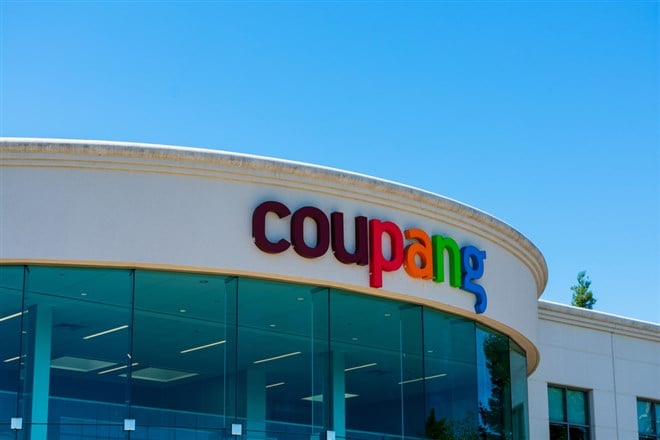
Coupang NYSE: CPNG stock is down 62% from its 52-week. Coupang is a South Korean e-commerce retail company based in Seoul, South Korea, and incorporated in Delaware, United States.
Coupang has a significant market share in the South Korean retail market and has been increasingly looking to move into other Asian markets such as Japan and Singapore. Historically, online retailers have not been able to produce a profit, and investors continue to worry that e-commerce retailers, in general, will never be able to turn a profit. Competitors such as Amazon NASDAQ: AMZN are still struggling to turn a profit on retail operations, with profits being primarily driven by their cloud operations.
Similarly, Coupang has been struggling to turn a profit and the general consensus is that it will eventually turn a profit once it achieves a certain level of backend infrastructure. But with the market correcting and the broader tech industry witnessing a decline, the stock is down significantly for the year.
Coupang has multiple businesses under its roof, including delivery similar to that of Amazon. It also has Rocket Wow, which it offers for 4900 KRW, which is its version of Prime, Rocket Fresh, which provides delivery of fresh food items, and Eats, a service similar to that of Uber Eats, which provides food-delivery services.
Can Coupang turn a profit?
Coupang’s business model is slightly different from that of Amazon’s. Unlike Amazon, they have a fixed fee structure along with a traditional percentage structure in which they charge their merchants. The fixed fee structure might allow them to cover a certain amount of fixed costs, and in turn, would allow them to concentrate on their variable cost structure on a more dynamic basis.
Coupang currently has a 20% market share in South Korea’s e-commerce market and is poised to increase that market share to the point that it could become a monopoly. The current market size of the South Korean retail market is around $330 billion and is set to grow at a rate of around 5% until 2030. South Korea is also the sixth biggest e-commerce market in the world at $92 billion and is expected to grow at around 13-15% until 2030.
Currently, Coupang's gross margins are around 20%, while general retail tends to have around 25% gross, most retailers have around 50% gross margins. Coupang would likely need to raise prices in order to achieve higher margins. Unless it at least gets closer to industry averages, it is unlikely to be able to turn a profit. Coupang’s biggest strength is that it does not hold inventory. By largely providing fulfillment centers, Coupang is able to reduce costs and compete with big box retailers. On the other hand, some of the cost advantages that big boxes have due to economies of scale might be lost.
Coupang’s valuation
Profitability remains an issue, with operating margins currently at -5.88%, and that remains a worry for investors who would be looking for Coupang to achieve operating profits before they jump back in. Cash flow remains negative but the company has around $3.6 billion in cash to fund its outlays for the foreseeable future. A lot of investors use metrics such as price-to-sales (P/S) when there is no profitability and for Coupang P/S currently stands at 1.2-1.4x. Amazon currently has a P/S of 2.3, which is mainly due to the cloud side of the business. Walmart NYSE: WMT is another retail giant with a P/S of 0.6. Considering Walmart will grow at a much slower pace compared to Coupang, many might consider valuation to be quite cheap.
Analysts Are Upgrading Coupang
Analysts have in recent times upgraded Coupang to outperform, and on average see a 50% upside from current levels. Coupang has also seen some large institutional investors and hedge funds taking up positions in the stock, including those who traditionally have a value-investing background.
Management's outlook
Management re-iterated that gross margins grew by 43% y-o-y and they expect to turn EBITDA profitable during late 2022. They have tried to ensure that utilization improves and that they ensure an efficient supply chain as they look to continue through the year. Inflationary pressures continue to be an issue, but a disciplined operation has ensured that the effects of those pressures have remained minimal. Finally, plans to expand to countries such as Japan and Taiwan remain on strong footing and management remains upbeat about prospects.
The general consensus for Coupang remains a positive one, and the stock may offer the long-term risk-reward that investors are looking for.
Before you consider Coupang, you'll want to hear this.
MarketBeat keeps track of Wall Street's top-rated and best performing research analysts and the stocks they recommend to their clients on a daily basis. MarketBeat has identified the five stocks that top analysts are quietly whispering to their clients to buy now before the broader market catches on... and Coupang wasn't on the list.
While Coupang currently has a "Moderate Buy" rating among analysts, top-rated analysts believe these five stocks are better buys.
View The Five Stocks Here
With average gains of 150% since the start of 2023, now is the time to give these stocks a look and pump up your 2024 portfolio.
Get This Free Report